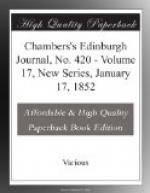His stay in London, which he reached in this primitive fashion, was not long. His kind friend Dr Stuart, who had exchanged into the Royal Horse-Guards, gave him the shelter of his roof; but so poor was Mr Jackson, that, although ardently desirous of improving himself in his profession, he was unable to attend any one of the medical schools with which London abounds.
The peace of 1783 having opened the continent to the curiosity of the British traveller, Jackson curtly announced to his friends, that ‘he was going to take a walk.’ His poverty allowed him no other mode of locomotion; so off he set on the grand tour, carrying with him a map of France, a bundle of clothes, and a scanty supply of money. Crossing the channel, he reached Calais, a place which Horace Walpole, writing from Rome, declared had astonished him more than anything he had elsewhere seen, but in which our adventurer found nothing more astonishing than a superb Swiss regiment. He proceeded to Paris, and thence through Switzerland, by Geneva and Berne, into Germany, at a town of which—Guenz in Suabia—he met with a comical enough adventure.
On entering the town he was challenged by a soldier, who, having learned he had no passport, carried him before a magistrate, by whom he was forthwith condemned as a vagabond, and remitted to the custody of a recruiting sergeant. This worthy, in turn, introduced him to the commanding officer, who politely gave our traveller the choice of serving his Imperial and Apostolic Majesty, the Emperor of Germany, either in his cavalry or his infantry forces. But Jackson, strangely insensible to the honour, flatly refused to serve his Majesty in these or any other ways, and desired to be at once set free, and suffered to continue his journey. The officer, doubtless amazed at such presumption, desired the sergeant to convey him to the barracks, where he was placed in a large room, in which were congregated some two hundred or so involuntary recruits like himself—harmless travellers, who, being destitute of passports, the emperor forcibly enlisted into his service. Jackson found his co-mates in misfortune very dirty, very ragged, but perfectly civil and good-tempered. Having a little recovered his serenity—for it is easy to




